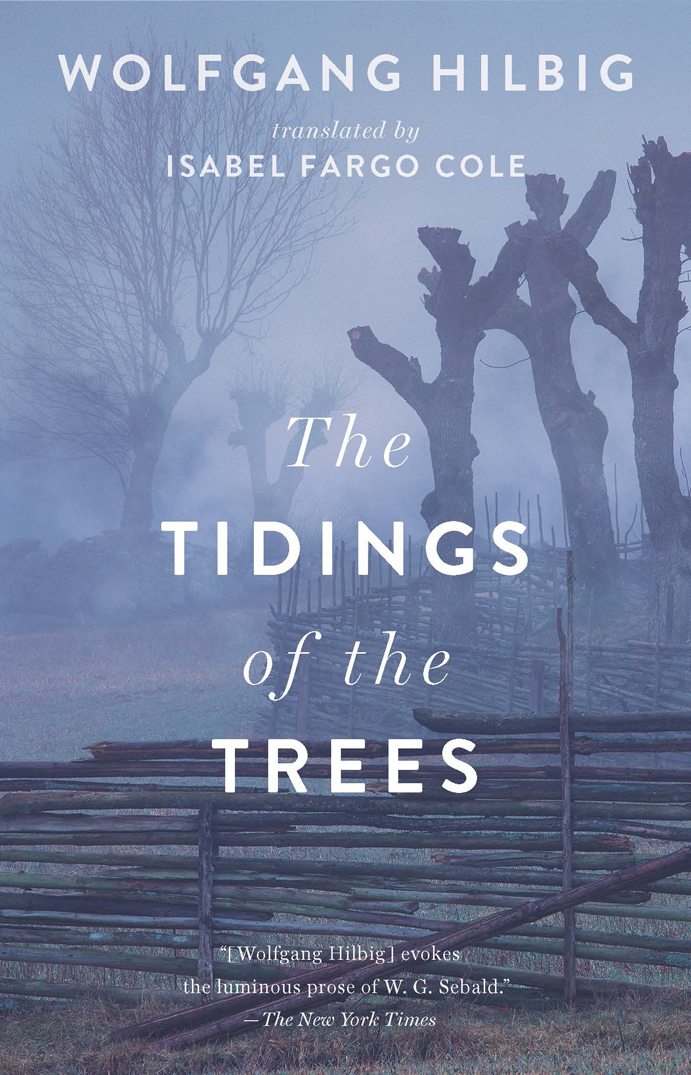Table of Contents
Guide

Other titles by Wolfgang Hilbig available from Two Lines Press
Old Rendering Plant
The Sleep of the Righteous

Originally published as Die Weiber, Alte Abdeckerei, Die Kunde von den Bumen by Wolfgang Hilbig, Werke, Erzhlungen
2010, S. Fischer Verlag GmbH, Frankfurt am Main
Translation 2018 by Isabel Fargo Cole
Two Lines Press
582 Market Street, Suite 700, San Francisco, CA 94104
www.twolinespress.com
ISBN 978-1-931883-73-3
Library of Congress Control Number: 2017958708
Cover design by Liliana Lambriev
Cover photo by plainpicture/Folio Images/Peter Gerdehag
Typeset by Jessica Sevey
1 3 5 7 9 10 8 6 4 2
This project is supported in part by an award from the National Endowment for the Arts.

The translation of this work was supported by a grant from the Goethe-Institut, which is funded by the German Ministry of Foreign Affairs.

Its increasingly rare to meet people who can tell a proper story.
WALTER BENJAMIN
Contents
What do I know now, said Waller, of the perplexities that came over me as I tried to write my first stories? Right here I falter: back then Id never have dared to put it that way! That act of story-writing consisted in an ongoing routine of crossing out words that had found their way to paper with no effort on my part. I seemed to have set them down in some kind of madnessI found whole lines, whole passages filled with words that could have arisen in no other way, all I could accept was the branching framework of the conjunctionsand suddenly it was as though someone, not I, had shone a lamp on them: my words, if I could still read them at all, were the falsest conceivable way to express what I actually wanted to name.
For that matter, I feel Ive mentioned these phenomena quite often enough by nowor maybe it just seems that way, since Ive longed to join the legions of writers who think these phenomena worth mentioningand Ive described them often enough, defining them now as a failure of my imagination, now as the inability to think abstractly, perhaps, too, as the loss of the reality behind the images: I always meant the same thing, grappling ad nauseam with this pseudo-problem. Yet my preoccupation has done nothing to assure me that I may feel myself to be a writer, sadly not! But lacking actual stories, as often as I could Ive let this plight stand in for the missing material. Now the whole thing has so exhausted me that in all seriousness Id need a new biography in order to wriggle out from the rough drafts of my non-authorship. For these drafts have become the only ground on which I can still move. Indeed, I am undermined by groundlessnessindeed, these drafts besiege me like an impenetrable barrier, perhaps imaginary, but encroaching upon me in an unbroken ring: all I can really do is wait until it strangles me.
Or is it that I feel Im about to be sliced apart? Over my narrow circle theres a pendulum, sinking lower with each swing, hurtling through the air with a hiss that sounds like: Speak! Speak! Or its a saw drawing near, rending the atmosphere with a noise that sounds like: Write! Write!
And I turn circles in my impenetrable, self-created thicket and cry: Out of here! Trapped in the creations of my self-prophylaxis, I tell myself: Outside is another life! Perhaps a life just waiting to begin. Perhaps even with a different name to offer me. How much easier to extract stories from a different life how should I explain my own? What should I make of this life, this life moving to and fro, back and forth, up and down the stairs, the streets, the edges, always on the runlife on the move: Ive made it! In my small sphere, crossed by paths paved with precautionsas if letting me trample my misgivings underfoothere Im always on my way, always as if my neck were broken: Oh, how Ive envied the lives of those who could spend life sitting down. A place to sit, a place to sit! Id lament, circling my empty chair. When I walked past windows and saw others behind their lit panesbent over their writing, I imagined, since I took even newspapers for pieces of writingI believed they must be happy.
And they were, too, or at least they were at peace with their unhappiness! If that was what I wished, I thought, I must never put myself in the awkward position of starting a story with the travails of storytelling. What could be duller, I thought, or more presumptuous, than books about writing books! It might be acceptable, or unavoidable, for tools to produce tools, machines to produce new machines. But when storytelling reconstructsor, in my case, manufacturesthe problems of telling stories, its the pinnacle of self-circumscription. To me it seems a total submission to inefficacyI dont know. Literature like that is unworthy of interest.
And yet I must come back to the pendulum. It sounds as though Ive described an old paradigm: that telling a story staves off an execution. As long as you can tell stories, youll go on living, says this paradigmthe executioner, fingering the release handle for the guillotine blade, wants to hear the conclusion of the story first. But this conclusion is not the end, it points toward a new story: another reprieve! Or the Good Lord, grasping the lever of the steam whistle at whose blast the heavenly hosts will speed earthward to bathe their swords in blood, waits for John to finish scribbling his book. These fantasies are all well and good, but the fear of that God and executioner is foreign to me. What drives me is the fear of forgetting the stories. I dont feel threatened, its the stories that are threatened: I see a darkness preparing to fall upon them. Writewrite, I say to myself, or everything will whirl into forgetfulness. Write so the thread wont be severeda thousand stories are too few. So the flow wont be broken, so the lamps over the desks wont go out. Write, or youll be without a past, without a future, nothing but a will-less plaything of bureaucracy. Youll lie stored in their databases, retrievable, a calculation, an accounting factor, just part of a sum whose loss was factored in from the beginning youll be cannon fodder.
Indeed, I always had the sense of walking on used-up matter, on burned-out material, on cinders, on ash, on slag. Forgetfulness covered the earth and smothered the life that still stirred within itif it still stirredceaseless waves of oblivion slid layer by layer over the ground: the dead present was digested and voided until it was nothing but history. Yes, I was walking on the true substance of history: dry, sandy material, forever lifeless, that whirled here and there with the fickleness of all the winds and settled gray or ruddy on all that lay within its diffuse motions sphereWaller paused for a moment, seeming to ruminate, then suddenly uttered a bleat of laughter.
What put me on that train of thought, you ask? It only seems to be a digression; I suddenly recalled that I actually did buy a writing desk. The desk, a battered and unsightly thing, was carted past my window one day on the street down which the east wind whistled into townthe wind that bore the worst heat in summercarrying in the salty, ruddy dust that would later cover that desks top. The dust was very visible, because the top was black. The desk was being taken to the ash fields, not far away; on an impulse I ran down and paid ten marks for the thing, an above-average sum, more symbolic than anything, but in return the man helped me carry it up the stairs. Up in my apartment, with the help of some bricks, I tried to stabilize the piece of furniture in a horizontal position, which barely succeeded, but now I actually did have a desk.
Next page















